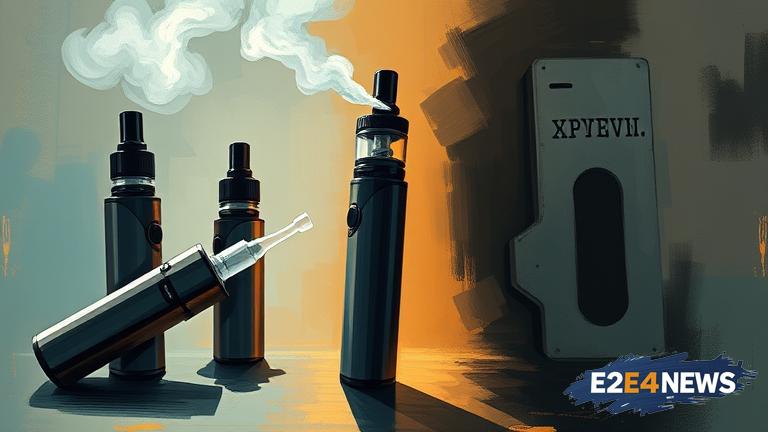In a recent development, Ireland’s health authorities have launched an investigation into nicotine-free vapes, citing concerns over their safety and potential health risks. The move comes as the popularity of vaping products continues to rise, particularly among young people. Nicotine-free vapes, also known as nicotine-free e-liquids, have been marketed as a safer alternative to traditional tobacco products. However, health experts warn that these products may still pose significant health risks, including respiratory problems and nicotine addiction. The investigation aims to determine the ingredients and chemical composition of these products, as well as their potential impact on human health. Researchers will also examine the marketing and sales practices of companies producing nicotine-free vapes, to ensure compliance with regulatory requirements. The Irish health authorities have expressed concerns over the lack of regulation and oversight in the vaping industry, which has led to a proliferation of unlicensed and untested products. The investigation is expected to shed light on the safety and efficacy of nicotine-free vapes, and inform policy decisions on their regulation and use. Meanwhile, health experts are urging caution, advising consumers to be aware of the potential risks associated with these products. They also emphasize the need for rigorous testing and regulation to ensure that vaping products meet strict safety standards. The use of nicotine-free vapes has been linked to several health problems, including respiratory issues, such as bronchitis and asthma. Furthermore, the long-term effects of using these products are still unknown, and health experts warn that they may have unintended consequences. The investigation into nicotine-free vapes is part of a broader effort to regulate the vaping industry and protect public health. Ireland’s health authorities are working closely with international partners to share knowledge and best practices in regulating vaping products. The findings of the investigation are expected to have significant implications for the vaping industry, and may lead to changes in the way these products are marketed and sold. In the meantime, consumers are advised to exercise caution when using nicotine-free vapes, and to be aware of the potential risks associated with these products. The investigation into nicotine-free vapes is a timely reminder of the need for rigorous regulation and oversight in the vaping industry. As the popularity of vaping products continues to grow, it is essential that health authorities take a proactive approach to protecting public health. The Irish health authorities’ decision to investigate nicotine-free vapes is a step in the right direction, and is expected to contribute to a better understanding of the safety and efficacy of these products. Ultimately, the goal of the investigation is to ensure that vaping products are safe and effective, and that consumers are protected from potential health risks. The investigation into nicotine-free vapes is ongoing, and the findings are expected to be released in the coming months. In the meantime, health experts will continue to monitor the situation closely, and advise consumers on the potential risks associated with these products. The use of nicotine-free vapes is a complex issue, and one that requires careful consideration and regulation. As the investigation into these products continues, it is essential that health authorities prioritize public health and safety above all else. The Irish health authorities’ investigation into nicotine-free vapes is a significant development, and one that is expected to have far-reaching implications for the vaping industry. The findings of the investigation will be closely watched, and are expected to inform policy decisions on the regulation and use of vaping products. In conclusion, the investigation into nicotine-free vapes is a crucial step towards protecting public health and safety. As the popularity of vaping products continues to grow, it is essential that health authorities take a proactive approach to regulating these products and ensuring their safety and efficacy.
